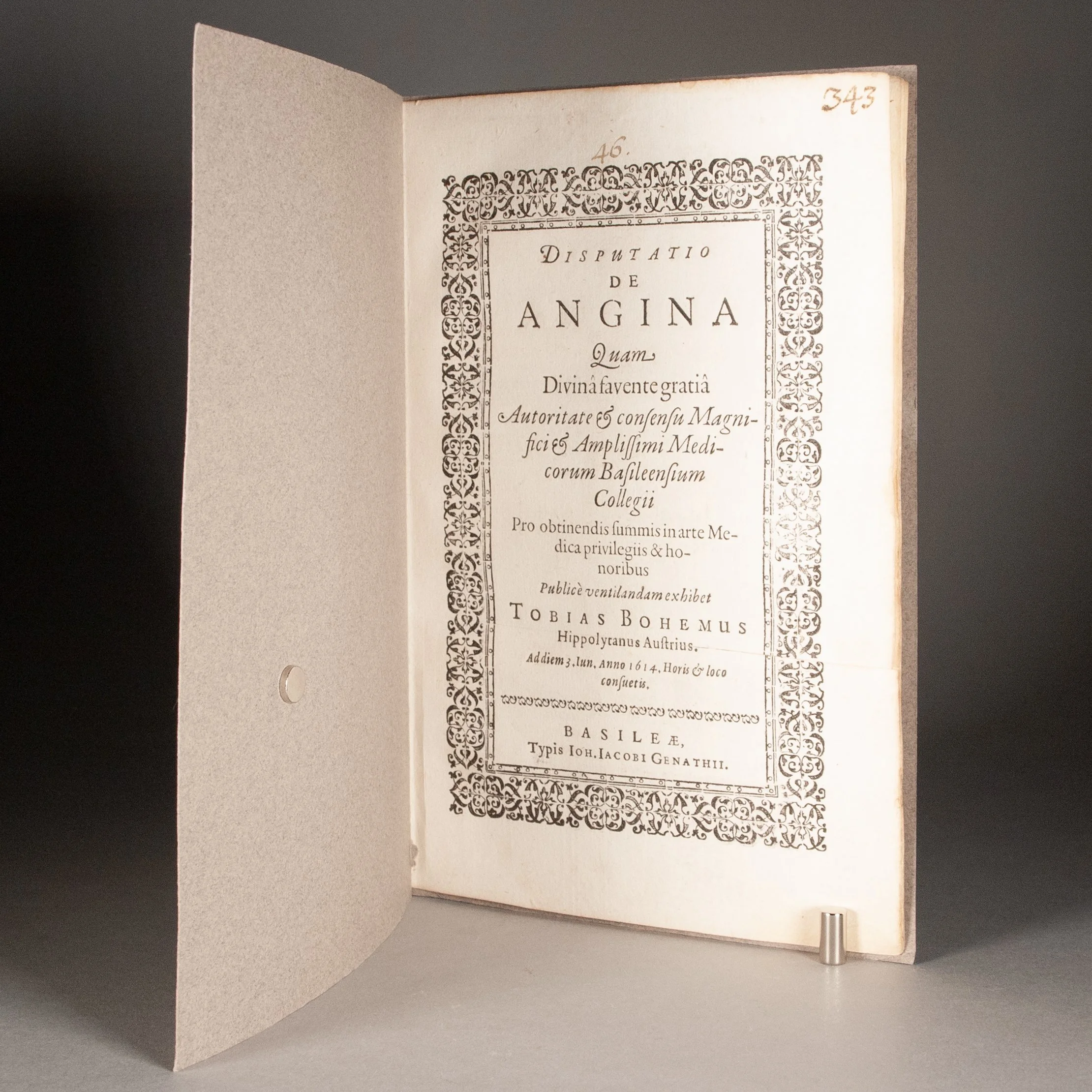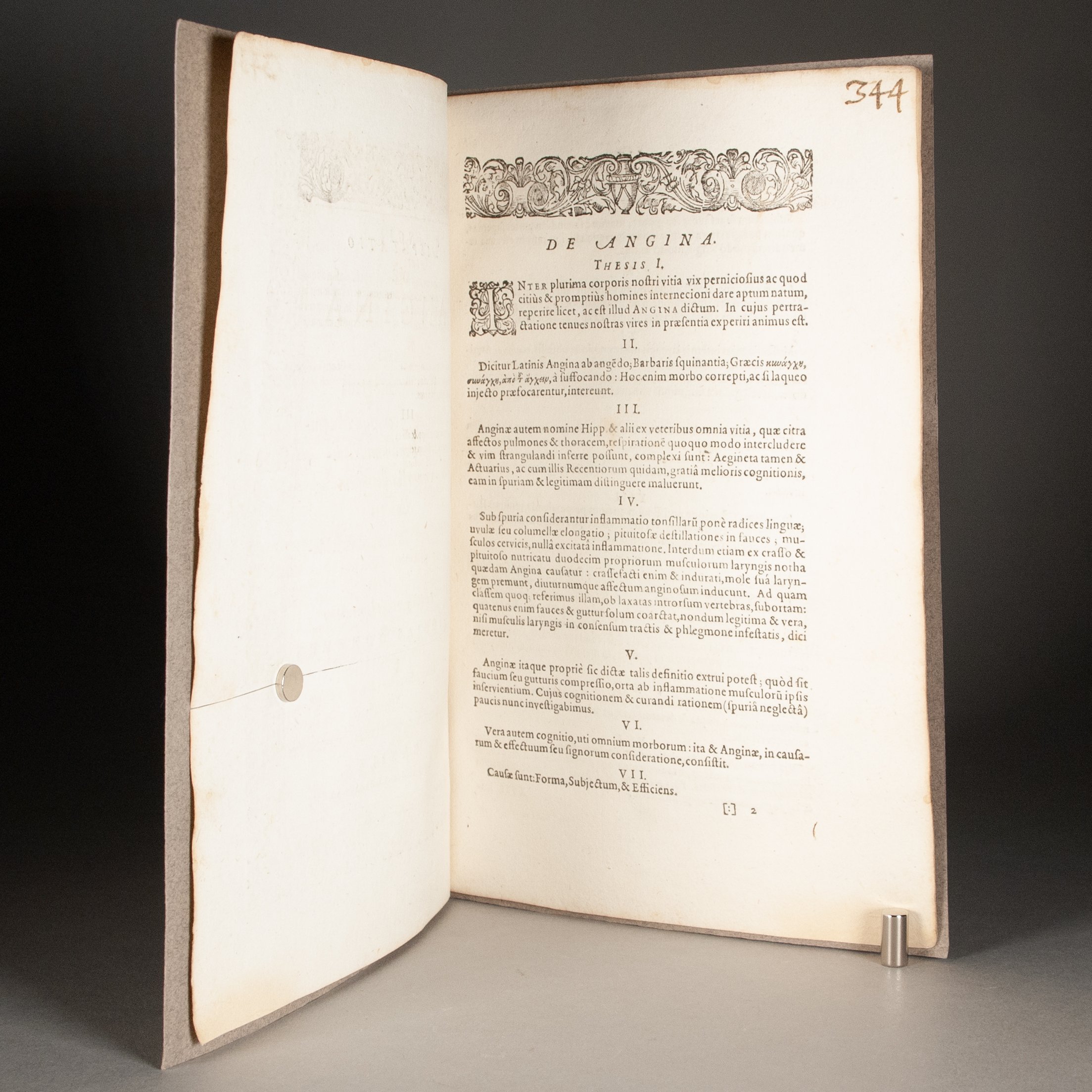Student's medical disputation


Student's medical disputation
Disputatio de angina quam divinâ favente gratiâ autoritate & consensu magnifici & amplissimi medicorum Basileensium Collegii pro obtinendis summis in arte medica privilegiis & honoribus; publicé ventilandam exhibet Tobias Bohemus Hippolytanus Austrius; ad diem 3 Jun. anno 1614, horis & loco consuetis
Tobias Bohemus (respondens)
Basel: Johann Jakob Genath, 1614
[8] p. | 4to | [:]^4 | 203 x 143 mm
First and only edition of the Basel student's disputation for his medical degree, his fifty theses providing an overview of what was then called quinsy, and what we today call peritonsillar abscess, an infection behind the tonsil. The disputation was to be held on 3 June 1614 "at the usual time and place" (horis & loco consuetis). The topic appears to have been rather popular at the University of Basel, as we find theses on the same subject published there in 1598, 1600, 1601, 1602, 1604, 1606, 1607, and 1611 (and surely more have gone unrecorded). Montaigne, who died in 1592, was perhaps the condition's most famous victim. ¶ We're rather fond of these fleeting relics of early modern academic life. It's seldom obvious who actually wrote the material found in these early academic disputations, though scholarship tends to give the edge to seasoned faculty over the student. “Such short treatises, normally written by professors for their students, for a fee, made no pretense to intellectual innovation. Rather, they reaffirmed the solvency of individual accounts in the vast, if increasingly fragile, central bank of bookish knowledge” (Grafton). The cost of printing, too, typically fell to the student, and they would be given gratis to friends, colleagues, or those in attendance. As a genre, it's easy to dismiss this voluminous body of unoriginal work. “But this neglect is not wholly justified, because cumulatively THEY REPRESENT THE MOST SUSTAINED ENGAGEMENT OF THE PERIOD with many aspects of controversial theology, judicial practice, medical innovation and science…it is the university dissertations that tell us how swiftly new concepts began to trickle down into the consciousness of the new generation of aspirant scholars and possibly even challenge traditional orthodoxies” (Pettegree and der Weduwen). ¶ We find two copies in North America (NLM and UCLA).
PROVENANCE: Extracted from a larger volume, with an item number inked on the title and old handwritten foliation. Such evidence is common among academic disputations. “Often when they had fulfilled their obligation to the graduating student to deliver the sixty or one hundred for him to distribute to professors, friends and those attending the defence, the printer would print a further batch. These could then be bound up with twenty or thirty other theses and sold commercially as a compendium, which is how many survive today" (Pettegree and der Weduwen).
CONDITION: Modern plain gray paper wrappers. Nicely printed, the title within a border of type ornaments, and with a head-piece, decorative initial, and tail-piece. ¶ The bottom third of the title leaf nearly sliced away, but holding; a little dusty; the lower outer corner dampstained, not affecting the text.
REFERENCES: USTC 2042753 ¶ Andrew Pettegree and Arthur der Weduwen, The Bookshop of the World (2019), p. 10-11 (“Latin books, such as funeral orations or student dissertations, were always distributed free to those attending (and in the case of the dissertations, printed at the students’ expense). This sort of work, which made up a surprising proportion of the output of the press, was extremely lucrative for the publishing trade. Commissions of this sort, dissertations or state ordinances, were all paid for in cash and delivered to a single client, so there were none of the usual costs of distribution and sale.”), 185 (cited above), 186 (cited above); Anthony Grafton, Commerce with the Classics (1997), p. 198 (cited above); Christian Coppens, "Does a University Need Books?" Leuven in Books, Books in Leuven (1999),p. 25 (“Students did not need many books to write theses or dissertations, since the professor himself generally produced the text")
Item #583
